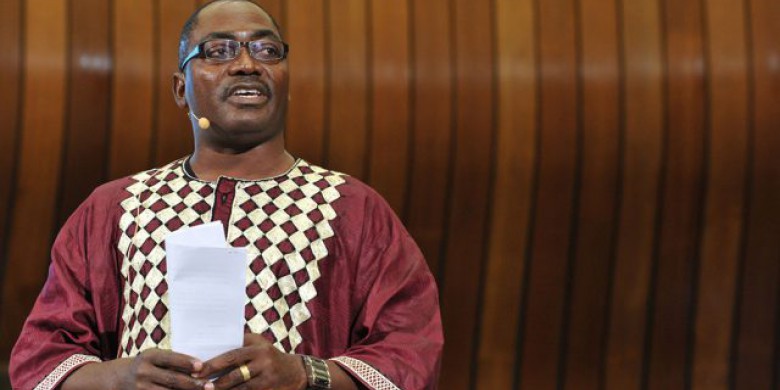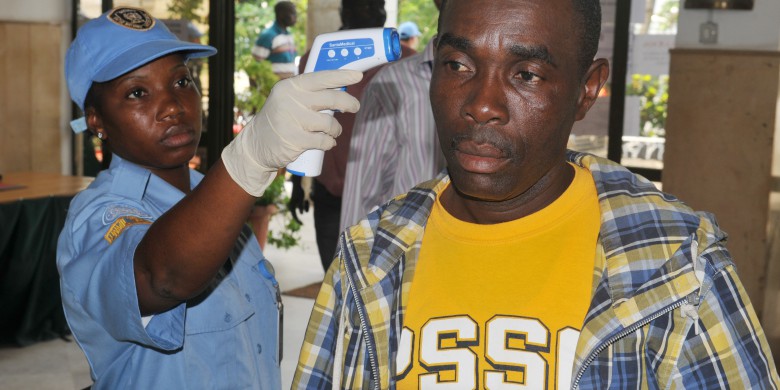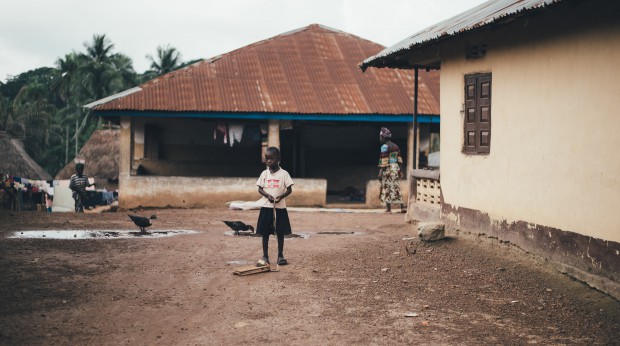
Countering Mistrust in Times of Corona
At times of acute crisis, it is easy to lose sight of the bigger picture. A global pandemic, like the one we are facing today, is a perfect example of where our natural response is to focus solely on the aspects which are most acutely affected: a nation’s healthcare system and its economy. However, the trickle-down effect of COVID-19 can seriously affect other crucial areas of life, particularly peace and conflict.
This is the second article in a series which zooms in on the role of civil society in supporting local response action. Via interviews with frontline responders, we discuss the short-term and long-term effects COVID-19 is having on prospects for peace and stability in their countries.

The Ebola epidemic is still very much engraved in the minds of the Liberian population, similarly to the country case of our first article, Sierra Leone. At the moment, COVID-19 cases are rising rapidly in Liberia and the death toll (4 out of 31 cases confirmed) is as disproportionate when compared to the global average.
The threat of COVID-19 stirs a fragile society that still has not managed to recover from its fourteen-year civil war, which ended in 2003. Another outbreak could not only decimate the population, but also set back the country’s development, economically as well as socially, for several decades. Fear and uncertainty, once again, dominate the mood of the nation.
Uniting a country where there is already a high level of mistrust towards the government during a global pandemic is an arduous task, and the lack of civil society involvement in the COVID-19 response process does not make it any easier. Even though placing communities at the forefront of response to the Ebola epidemic proved to be a vital driver of its eradication back in 2015, the current Liberian government remains reluctant to engage civil society this time around.
Discussing COVID-19 in a setting of conflict, corruption and inequality, the Secretariat of the Civil Society Platform for Peacebuilding and Statebuilding (CSPPS) spoke at length with James Shilue, Deputy Focal Point of the CSPPS Country Team and Executive Director of the Platform for Dialogue and Peace for the second article in this series.
Shilue emphasises that civil society plays a vital role in addressing mistrust: civil society can form the necessary link between communities and their government. Allowing civil society to both represent what is needed from the perspective of the community, and at the same time, be the ones relaying important information to those mistrusting communities, is the societal glue that could start closing the gap between a people and its government. This consultation, when embarked upon, should not only be of symbolic value. Instead, it needs to move beyond tokenism: meaningful multilateral consultations should allow for open and frank discussion amongst all relevant stakeholders on pathways to address national challenges.
“Because of the history of corruption and deep-rooted mistrust of the government and weak public services, Ebola quickly penetrated Liberia at the time”, Shilue tells us. “When the Ebola crisis happened, former President Ellen Sirleaf, used the conventional approach that we are now seeing in some other countries [during COVID-19]: using security forces to ensure compliance. She set up a governmental task force with rules and regulations that some considered to be draconian. These regulations were not formulated with the involvement of the communities, although they concerned them.”

Before President Sirleaf decided to engage civil society in the response to the Ebola outbreak, mass protest against theabout how piles of corpses were left to rot on the streets for days on end, and clashes with the military occurred due to violently enforced lockdowns in the slums. Health workers fled, afraid of contracting Ebola when in contact with patients. People feared going to hospital, as the inability to test for the virus meant that many were misdiagnosed by the authorities. Once diagnosed, accurately or not, they were left untreated out of fear of contamination, which led to many unnecessary deaths from easily treatable diseases such as cholera, malaria, and typhoid fever. Out of pure mistrust, government health facilities were therefore attacked, and patients were brought back home, allowing for the further spread of the virus.
“People resisted the entry into communities, there was misconception, misunderstanding, there was stigmatization. There were all these conspiracy theories about why communities could not allow health authorities to enter the community. And this causes chaos, which we do not want.”
The outbreak directly affected the stability of the country, and there is fear that COVID-19 will do the same. Peacebuilding and statebuilding become ever more pressing in times like these. Holistically involving all aspects of civil society in the response to COVID-19, especially in a nation with over 1,500 civil society organisations (CSOs) and more than 900 community-based organisations. In the face of a global pandemic, these organisations are vital in reaching out to the most remote communities, which lack access to resources such as water and electricity and which, most importantly, lack trust in their government.
“The issue of mistrust has not only been restricted to the current epidemic, the issue of mistrust has been on the entire process of governance and it is good to understand it from that perspective”, Shilue continues.
“There have been so many questions about issues of corruption, accountability and transparency and I can tell you one of the main reasons why people had difficulties from the onset is the failure of the government to declare its assets.”
During the first six months of the current president’s term, George Weah, the population felt there was a lack of transparency regarding government expenditure. On top of the state not being able to provide even the most basic of social services and infrastructure, this has added to the feeling that the Liberian people do not have a choice or say in the direction in which their country is headed. Instilling precautionary measures, which restrict their liberty even more in light of the current pandemic, becomes an entirely different ballgame in this context.
Shilue argues that civil society forms the necessary link between communities and their government. “But this can only happen once you have a government that is open to collaboration with local civil society, one that is transparent and accountable, and one that does not portray civil society as the “favourite child of the West who receives all the resources”. Rather than spoiled children, civil society organisations are valuable non-state actors, capable of providing the necessary insights and experience from an on-the-ground perspective, whether or not a crisis is ongoing.

Due to a (partial) governmental shutdown during the Ebola epidemic, international funding and support, which normally passes through the bureaucratic channels of government, were directly funnelled to civil society, allowing for a quicker and more efficient roll-out of necessary actions and projects. Although beneficial at the time for the entirety of the nation, the current government still harbours the notion that this past experience places civil society within the international system as outsiders, rather than at the core of its domestic system.
In doing so, the government risks not utilising its human as well as material capacities to its full potential: during Ebola, whilst bringing in the chiefs, women’s groups, students, NGOs and others, people finally had the opportunity to share their perceptions and experiences. Overcoming a complicated matter, like this global pandemic, requires mutual engagement and trust. Only through a whole-of-society approach can a solution be found that works for and through all layers of society. In doing so, this approach needs to take into account not only the medical point of view, but also the pandemic’s social context.
Aside from President Weah’s recent call to the Liberian population to unite during COVID-19 on April 8th, no practical steps towards a whole-of-society approach, which is needed in order to tackle the wider implications of COVID-19 holistically, have been made. Civil society itself, however, is looking ahead, and laying out its own plan for the devastating effects of the pandemic.
Cultural collectivism and gender inclusivity amidst global calls for social distancing
“The effect on women will always be disproportionate”, Shilue states. He foresees that, due to women traditionally being assigned tasks like taking care of the sick and elderly, and trading on the markets, they will, inevitably, be most directly exposed to the virus. Moreover, if the gravity of this outbreak worsens and if a total lockdown becomes imposed, women will be confined to their homes. These women, some of them widows, rely entirely on the little income they get from their jobs to provide for their families and send their children to school.
“Some of their partners are or have been abusers. We live in a patriarchal society. Sometimes when a woman wants to talk, it is often for her to hear: “shut up, you are a woman. When the men are talking, you don’t talk.”
“Some of their partners are or have been abusers. We live in a patriarchal society. Sometimes when a woman wants to talk, it is often for her to hear: “shut up, you are a woman. When the men are talking, you don’t talk.” By going to work for themselves, it brings some sense of self-worth, and income. If these women have to use all of the little savings that they have, they could end up subjecting themselves to abusers. Or rely on family for support, who might have conditionalities.”
COVID-19, in a country that already has a high record of gender-based violence, will affect the security of women, both economically, as well as physically, and will thus create more tension nation-wide. According to the Ministry of Gender, Children and Social Protection, 1,413 cases of gender-based violence were documented in 2016, with an increase to 1,685 in 2017 and an even higher total of 2,105 in 2018. A lockdown, which is likely to be declared at a certain point during the pandemic, is expected to steepen these numbers in to unprecedented levels. As markets and shops will be closed, women will be confined to their homes, without any source of income and, thus, independence. Therefore, Shilue and his Platform for Dialogue and Peace are exploring alternative modalities to effect social change: they want to highlight the gains and dividends associated with investing in gender equality.
According to UNESCO, Liberia has an average adult literacy rate of 43%. Amongst men, the literacy rate is 61%, but the female literacy rate is at a staggering low of 27% of the population. Educating communities about disease transmission and prevention is not easy with such low literacy rates, let alone sufficient to promote behavioural and cultural changes in the long term.
Shilue and his organisation are therefore reaching out to several women’s organisations, not only to set up visual messages about COVID-19 awareness, but particularly, to call attention to the expected spike in gender-based violence should a lockdown occur. Their intention is to jointly set up a campaign based on graphics that can be distributed via mobile phones for women in the urban areas, as well as in other ways for the more rural areas, where mobile phones are scarce.
Most importantly, however, is for the women themselves to be involved in both the design as well as the distribution of messages. Research has shown that when information is distributed by men, even feminist men, women will not trust this information, due to the negative experiences they have had. Empowering these women, and demonstrating their aptitudes especially during a health crisis, is what will contribute to Liberia’s resilience in the long run.
“Women are turning things around, even against all the odds,” proclaims Shilue, as he describes how women in local communities set up a so-called ‘susu’ during the Ebola outbreak, a traditional way of pooling money together which is then given to members of the community in need on a rotational basis. People return to their old ways in times of crisis: when everything shuts down, and resources are scarce, Liberia’s cultural collectivism steps up to jointly provide what is needed, when their government cannot.
A holistic approach to terrible problems
Unfortunately, the issue of trust, or lack thereof, remains a major obstacle to achieving sustainable peace, in all layers of Liberian society: from state-citizen relationships to within societal and family structures. Peacebuilding and reinforcing resilience in fragile countries, especially during a global pandemic, is therefore undeniably critical at this moment in time. “The fragility of a state will remain, as long as those factors that created the problems are still present”, Shilue says while referring to British political economist Paul Collier. Post-war Liberia focused on setting up the physical side of security: the military, legitimacy of the government, immigration, police capacity and so on. Every other aspect of insecurity is however still pervasive: corruption, inequality, nepotism, gender-based violence and so on.
Liberia needs the international community to remain committed to its promises in terms of support and development aid. The United Nations Mission in Liberia (UNMIL) and the international community were there during the Ebola outbreak, which has put them among the few partners the Liberian society can actually rely on, within the setting of their fragile state. Let us not break this thin layer of trust and honour our commitments. We could nurture some of that cultural collectivism which keeps Liberia’s society going, against all the odds, and unite in the face of COVID-19.
This article is the second in a series on the role of civil society in supporting local action during COVID-19. A whole-of-society and conflict-sensitive approach to the current global pandemic is the only sustainable option. CSPPS therefore urges the leveraging of all expertise, nurture solidarity in times of shared struggle, avert the exacerbation of social discord, and steer clear from sacrificing prospects for peace.
A short-term focus on emergency response and humanitarian aid in times of crisis is undoubtedly invaluable. However, a long-term vision by working across the Triple Nexus of humanitarian, development and peace work, in order to build resilient societies worldwide is crucial.
Human security entails every aspect of life: not only our health system or the economy, but also gender, human rights, the environment and more. It involves the vulnerable and the strong, the poor and the rich. Mistrust and antagonism can only be taken away through repeated interactions between all stakeholders, on an equal footing. Equally, sustainable peace, and thus, development, can only be achieved when truly nothing, and no one, is left behind.
Article by Charlotte de Harder - CSPPS

